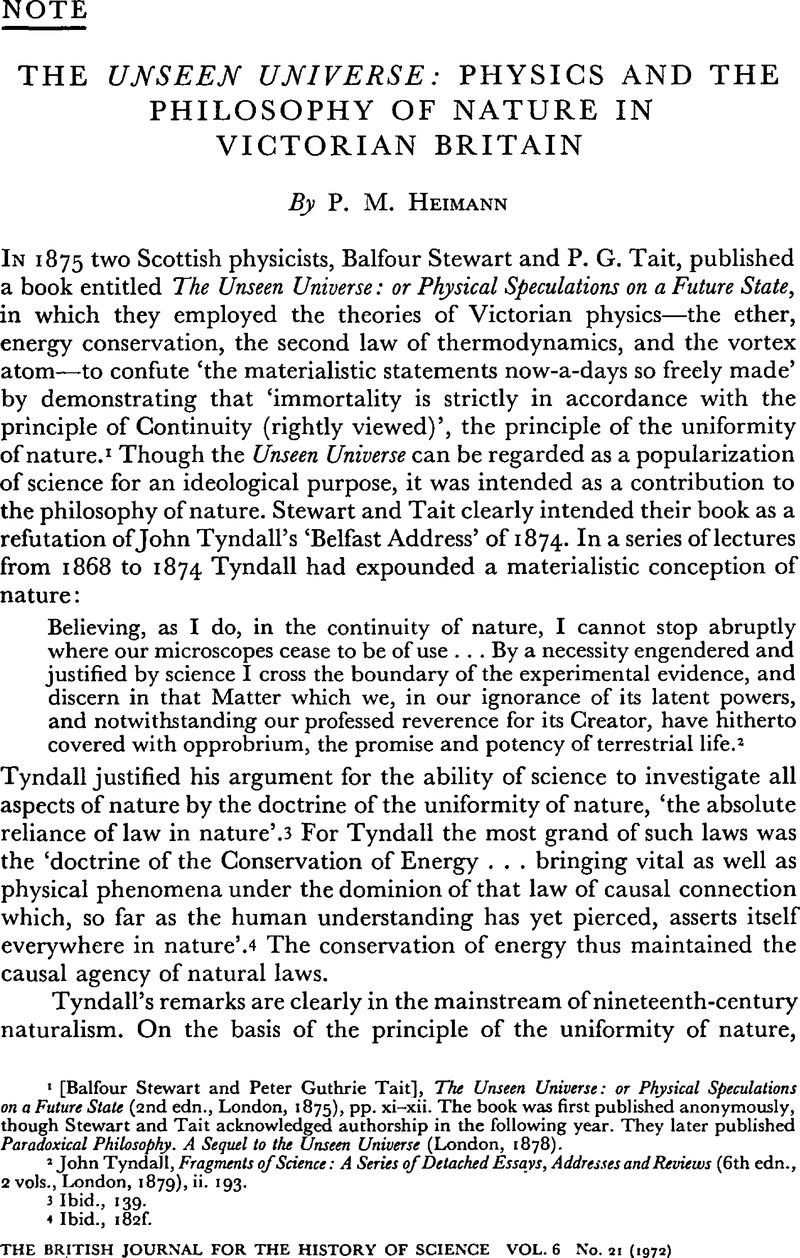Article contents
The Unseen Universe: Physics and the Philosophy of Nature in Victorian Britain
Published online by Cambridge University Press: 05 January 2009
Abstract

- Type
- Note
- Information
- Copyright
- Copyright © British Society for the History of Science 1972
References
1 [Stewart, Balfour and Tait, Peter Guthrie], The Unseen Universe: or Physical Speculations on a Future Stale (2nd edn., London, 1875), pp. xi–xii.Google Scholar The book was first published anonymously, though Stewart and Tait acknowledged authorship in the following year. They later published Paradoxical Philosophy. A Sequel to the Unseen Universe (London, 1878).Google Scholar
2 Tyndall, John, Fragments of Science: A Series of Detached Essays, Addresses and Reviews (6th edn., 2 vols., London, 1879), ii. 193.Google Scholar
3 ibid., 139.
4 ibid., 182f.
5 Lyell, Charles, Principles of Geology, being an Attempt to Explain the Former Changes of the Earth's Surface by reference to Causes now in Operation (3 vols., London, 1830–1833).Google Scholar For a discussion of Lyell's uniformitarian system of earth history see Rudwick, M. J. S., ‘The strategy of Lyell's Principles of Geology’, Isis, Ixi (1970), 5–33.Google Scholar For discussion of the geological debates in this period see Gillispie, C. C., Genesis and Geology. A Study in the Relations of Scientific Thought, Natural Theology, and Social Opinion in Great Britain, 1730–1850 (Cambridge, Mass., 1951)Google Scholar and Cannon, W. F., ‘The uniformitarian-catastrophist debate’, Isis, li (1960), 38–55.CrossRefGoogle Scholar On the principle of uniformity see Hooykaas, R., The Principle of Uniformity in Geology, Biology and Theology (Leiden, 1963).Google Scholar
6 Essays and Reviews (London, 1860), p. 110.Google Scholar
7 Powell, Baden, The Order of Nature Considered in Reference to the Claims of Revelation (London, 1859), pp. 231–2.Google Scholar
8 Whewell, William, Philosophy of the Inductive Sciences, founded upon their History (2 vols., London, 1840), ii. 134.Google Scholar
9 ibid., 144. For discussion of Whewell see Cannon, W. F., ‘The problem of miracles in the 1830s’, Victorian Studies, iv (1960), 5–32.Google Scholar
10 See Young, R. M., ‘Darwin's metaphor: does Nature select?’, The Monist, Iv (1971), 442–503.CrossRefGoogle Scholar
11 SirThomson, William (Baron Kelvin), Popular Lectures and Addresses (3 vols., London, 1889–1894), ii 203ff.Google Scholar
12 Maxwell, James Clerk, ‘Molecules’, in The Scientific Papers of James Clerk Maxwell, ed. Niven, W. D. (2 vols., London, 1890), ii. 376.Google Scholar Maxwell's phrase that molecules were manufactured articles was derived from Herschel, John, Preliminary Discourse on the Study of Natural Philosophy (new edn., London, 1851), p. 38Google Scholar: atoms had ‘the essential characters, at once, of a manufactured article and, a subordinate agent’. For a discussion of these ideas in relation to other aspects of Maxwell's natural philosophy see Heimann, P. M., ‘Molecular forces, statistical representation and Maxwell's demon’, Studies in History and Philosophy of Science, i (1970), 189–211.CrossRefGoogle Scholar
13 [Stewart and Tait], The Unseen Universe, p. 192.Google Scholar
14 ibid., p. 172.
15 For a full discussion of the role of active principles in Newton's philosophy of nature see McGuire, J. E., ‘Force, active principles and Newton’s invisible realm’, Ambix, xv (1968), 154–208.CrossRefGoogle Scholar
16 For a discussion of Hutton's philosophy of nature see Heimann, P. M. and McGuire, J. E., ‘Newtonian forces and Lockean powers: concepts of matter in eighteenth-century thought’, Historical Studies in the Physical Sciences, iii (1971), 233–306.CrossRefGoogle Scholar
17 Newton MS., quoted in McGuire, , op. cit. (15), 200.Google Scholar
18 [Stewart and Tait], The Unseen Universe, pp. 90ff.Google Scholar
19 ibid., p. 64.
20 Young, Thomas, A Course of Lectures on Natural Philosophy and the Mechanical Arts (2 vols., London, 1807), i. 610.Google Scholar
21 See McGuire, J. E., ‘Atoms and the “analogy of Nature”: Newton's third rule of philosophizing’, Studies in History and Philosophy of Science, i (1970), 3–58.CrossRefGoogle Scholar
22 [Stewart, and Tait, ], The Unseen Universe, pp. 158f.Google Scholar
23 ibid., p. 164.
24 ibid., p. 172.
25 ibid., p. 60.
26 ibid., p. 189.
27 ibid., pp. 60ff.
28 Reid, Thomas, Essays on the Active Powers of the Human Mind [1788], ed. Brody, B. (Cambridge, Mass., 1969), p. 47.Google Scholar
29 Bain, Alexander, Logic (2 vols., London, 1870), ii. 30fGoogle Scholar; also Logic (2nd edn., 2 vols., London, 1896), ii. 20f.Google Scholar Tait attacked Bain's use of the term ‘force’ in the first edition of the Logic in an address to the University of Edinburgh (Nature, iii [1870], 89f.)Google Scholar, scathingly pointing out that Bain's ‘force’ should be replaced by ‘energy’. Bain's use of ‘force’ here is in line with the tradition discussed by Professor J. E. McGuire and myself in the paper cited in note 16. Tait took a relational view of force but a substantive view of energy.
30 The performance did not satisfy William Kingdon Clifford, who savaged the book in the Fortnightly Review, concluding that ‘It is clear that the good old gods of our race—sun, sky, thunder and beauty—are to be replaced by philosophic abstractions—substance, energy, and life, under the patronage respectively of the persons of the Christian Trinity’; see Clifford, , Lectures and Essays (2 vols., London, 1879), i. 251.Google Scholar
- 16
- Cited by


